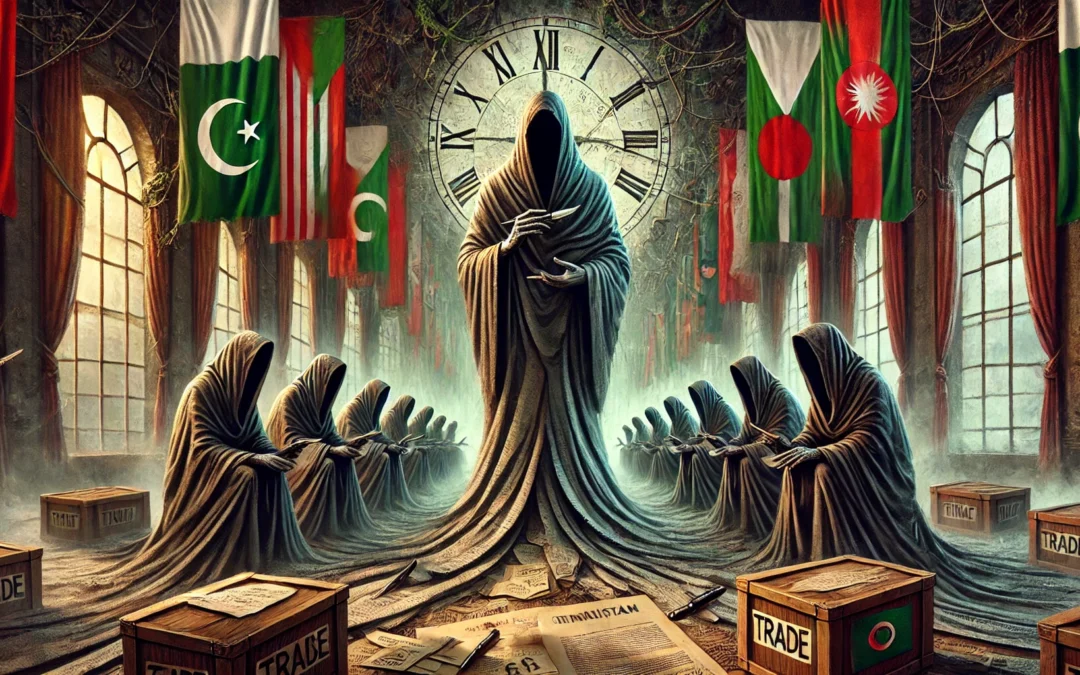The announcement that a high-powered delegation from Pakistan’s top trade and business federation is visiting Bangladesh has raised more than a few eyebrows. Once adversaries locked in a bloody war for independence, these two nations share a turbulent history that few have forgotten. After 54 years of acrimony, Pakistan’s sudden eagerness to bolster trade ties with Bangladesh seems to be more than just a gesture of economic goodwill. Could this be a strategic manoeuvre by Pakistan’s infamous deep state to rewrite history and advance its anti-India agenda?
To truly understand the scepticism surrounding this overture, one must revisit the historical scars left by Pakistan’s brutal military campaign during Bangladesh’s liberation war in 1971. The Pakistani army’s actions, supported by political and military elites, were characterized by mass atrocities, war crimes, and a systematic effort to suppress the Bengali independence movement. An estimated three million people lost their lives, and the nation’s collective trauma still echoes today.
Even after Bangladesh achieved independence, Pakistan refused to acknowledge its culpability. Successive Pakistani governments have failed to offer an official apology for the atrocities, let alone show genuine contrition. Given this historical context, Bangladeshis have every reason to question Pakistan’s sudden interest in strengthening ties. Is this a genuine attempt to foster mutual prosperity, or is Pakistan using trade as a Trojan horse to exert influence?
Pakistan’s Deep State: A History of Manipulation
Pakistan’s reputation as a “deep state” actor—where its military and intelligence agencies often operate beyond civilian oversight—adds another layer of suspicion. The Inter-Services Intelligence (ISI), for instance, has a long history of meddling in regional affairs, from supporting insurgent groups in Afghanistan to orchestrating anti-India campaigns. Could Pakistan’s trade delegation be part of a broader strategy to gain a foothold in Bangladesh, thereby undermining its sovereignty?
Observers argue that Pakistan’s trade overtures could be a covert attempt to rekindle old alliances with Islamist factions in Bangladesh, many of whom still harbour sympathies for Pakistan. During the 1971 war, certain Islamist groups in Bangladesh sided with the Pakistani military, participating in atrocities against pro-independence forces. Some of these groups have been revived in recent years, albeit on the political fringes. By strengthening economic ties, Pakistan might aim to empower these factions and destabilise Bangladesh’s secular political framework.
The Anti-India Agenda
Another pressing concern is Pakistan’s perennial anti-India obsession. Since independence, Pakistan has viewed India as its existential rival, often seeking allies to counterbalance India’s regional dominance. By engaging with Bangladesh, Pakistan might try to drive a wedge between Dhaka and New Delhi, whose relations have generally been cordial in recent decades.
India has steadfastly partnered with Bangladesh, aiding its liberation struggle and supporting its economic development. Any drift in this alliance would serve Pakistan’s strategic interests. Could Pakistan’s trade overtures be an attempt to lure Bangladesh into its orbit, thereby weakening India’s influence in South Asia? The timing of this initiative, amidst growing geopolitical tensions in the region, makes the question all the more pertinent.
The Cost of Trusting Pakistan
Can Bangladesh afford to trust Pakistan? The short answer is not without extreme caution. Economic engagement is not inherently bad, but any agreements must be scrutinised for hidden motives. Bangladesh’s leaders must remain vigilant against attempts to use trade to undermine national interests.
Moreover, Bangladesh should demand accountability from Pakistan. Before discussing trade and diplomacy, Pakistan must address the unresolved issues of 1971, including an unequivocal apology and reparations for the victims of its military campaign. Without this, any talk of partnership rings hollow and risks trivialising the sacrifices of Bangladesh’s freedom fighters.
A Lesson in Sovereignty
Bangladesh’s rise as a thriving economy and a regional player is a testament to its resilience and determination. While trade diversification is a commendable goal, it must not come at the expense of national sovereignty or historical accountability. Pakistan’s deep state has repeatedly shown that it prioritises strategic gains over ethical considerations. For Bangladesh, the past is not merely a chapter to be forgotten but a lesson to guide its future dealings.
As Pakistan’s delegation arrives, the question lingers: Is this a genuine olive branch or a calculated gambit by a state that has repeatedly weaponised diplomacy and economics for geopolitical leverage? History warns everyone to tread carefully.






